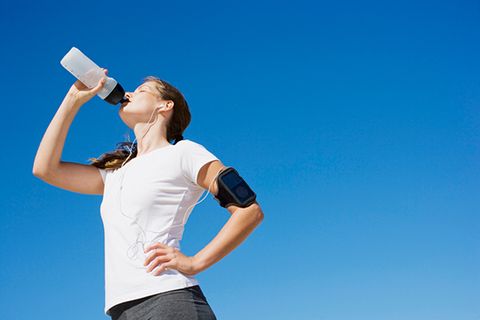Hydration Tips for Running
Nutrition with Becca Blumberg
Water is essential for us humans. Without it, our bodies can’t function, period. But since we’re kind of a running-focused company, let’s talk about hydration in running. As a nutritionist and long-distance runner, I want to share my best Hydration Tips for Running with you.
Hydration Tips for Running – Understanding Dehydration
While running, we need to stay hydrated to maintain a normal body temperature and consistent blood flow to our organs and muscles to provide nutrients and oxygen and remove waste. When our bodies don’t have enough water, there’s a higher risk of fatigue and cramping, and our performance suffers. In the bigger picture, water is crucial to keep our joints lubricated, promote recovery from workouts, and prevent injury.
How much water we lose during the day depends on many factors. Temperature, altitude, and humidity all have a big influence. Genetics also impact our sweat rate and composition, and whether we live in estrogen- or testosterone-fueled bodies matters, too. The phase of the cycle will also play a role for those who menstruate.
Signs of dehydration start with thirst, dry mouth, and fatigue. As things progress, you may notice cramps, nausea, and headaches. The problem is that by the time you notice these signs, it’s often too late to catch back up and replace the lost fluids. Drinking early and regularly is the one thing that can prevent this.
Hydration Tips for Running – Hydrating for Your Race
Start working on your hydration even before you begin your run; aim for 16-20 ounces of water 2-4 hours before the workout or at least 8-16 ounces within the last hour before you start. Pro-tip, drink hot water on a cold day and cold water on a hot day to help your body maintain a normal temperature.
During your run, aim for 16-32 ounces of fluid each hour. This should be spread out evenly; drink a little every 15-20 minutes. Your goal should be to replace at least half of the fluids you’re losing. To determine the rate at which you dehydrate, you can do an at-home sweat test.
Sweat Test
- Weigh yourself right before the following test run.
- Go for an hour-long run in conditions similar to what you expect at your race.
- Don’t drink anything (or pee) during this run.
- Weigh yourself immediately after the workout.
- Do the math. Remember that saying, a pint’s a pound, the world around? Well, each pound you’ve lost represents a pint of fluid. For example, if you lost two pounds, you’ll want to drink at least 16 ounces an hour during your race and other workouts, especially the long training runs.
After your run, you need to begin rehydrating immediately. Drink 16-20 ounces right away, then try and replace ALL the fluid you’ve lost within four hours. Again, adjust the temperature of the fluids to help your body regulate.
Hydration Tips for Running – Electrolytes for long-distance running
If your run is longer than 90 minutes, you should also replace electrolytes. Look for a solution with carbohydrates as they boost the uptake of salt. Look for about 14-15 grams of carbs, 25-30 mg of potassium, and 80-100 mg of sodium per 8 ounces of fluids. This is optimal for electrolyte replacement Many athletes like one bottle of plain water and one with a sports drink which they alternate. Try to mix your sports drinks according to package directions; too weak and it won’t have any real benefit; too strong and it may upset your stomach.
I recommend keeping electrolytes and calories separate. This allows you to fine-tune each to what your body needs that day based on conditions and other factors. Always listen to what your body needs.
Finally, make sure to PRACTICE your hydration strategy. Remember the Golden Rule: nothing new on race day! You’ll want to make sure to have your sports drink dialed; what brand works? How much and how often do you plan on drinking? All these questions need to be answered before you toe the start line.
About Becca Blumberg

Becca (she/her) is a registered dietitian-nutritionist (RDN) based in Fort Collins, CO. She has a Masters in Human Nutrition from Colorado State University and completed a dietetic internship in the Northern Colorado area focused on wellness & lifestyle medicine and is a certified intuitive eating counselor. She’s also a personal trainer and RRCA Level 1 Running Coach. She’s passionate about helping people achieve their endurance goals and seeing the ripple effect that this can create for them.
If you have any questions, are looking for general advice, or just want a nutritionist to have your back, check Becca out at https://www.facebook.com/Ripple.Nutrition or rippleenutrition.wixsite.com/ripplenutrition or reach out to her @ripple.nutrition on Facebook or at beccablumberg@gmail.com.


